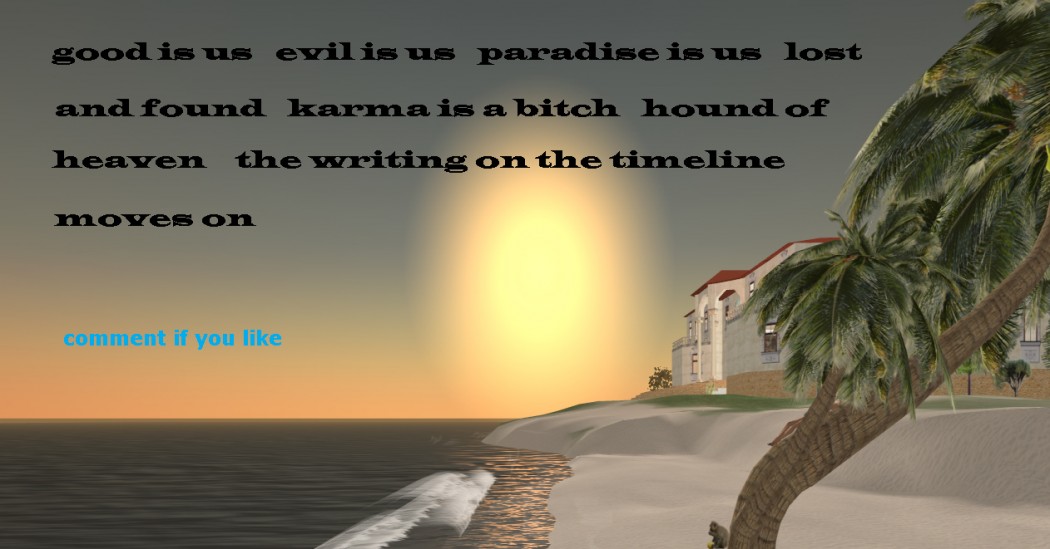Half the world believes in some form of reincarnation.
Steve Jobs believed that in a past life he was a pilot in World War II and said that sometimes that life still resonated with him. While he was driving he would feel an urge to pull back on the joystick and take off.
But the phenomenon of reincarnation is far from a New Age thing.
General George S. Patton believed that he was a warrior through many lifetimes and he didn’t care who knew it.
http:://www.reversespins.com/patton.html
General Patton saw himself as part of a type, a warrior class, whose warriors reincarnate throughout history and fight for their countries in times of crisis.
My psychic said that I belong to the creators and teachers type.
Partly because of my training in philosophy I am accustomed to thinking in terms such as all of Being, the whole of consciousness and the individual’s relation to the whole
.
Carl Jung
Recently, it occurred to me that Carl Jung wrote many books about his personal experiences and discoveries relating to omni-consciousness and the individual.
He also wrote about types or archetypes.
I was drawn to a book that I had not read – Memories, Dreams, Reflections. Jung wrote this book when he was 83 years of age.
Carl Jung was not writing about reincarnation as such, but he gave me the clearest insight into this phenomenon up to now.
As a very young child Jung was already driven to ponder and question many things, dreams and visions that he learned to keep secret because no one understood what he was about.
Over a lifetime of examining his own dreams and fantasies as well as those of his patients, Carl Jung sought to uncover truth in whatever direction it led him, at times risking his professional reputation and friendships.
He came to realize that when a person dies he goes to the hereafter knowing only what he has learned through his personal experience and choices in his lifetime, and in any case that knowledge is limited to what he and his fellow humans have brought to the collective consciousness at that moment in time.
If he wants to know more, he can do this only by living in a body.
In other words, if he desires more knowledge he must reincarnate.
Here are the relevant passages in Carl Jung’s own words:
If there were to be a conscious existence after death, it would, so it seems to me, have to continue on the level of consciousness attained by humanity, which in any age has an upper though variable limit. There are many human beings who throughout their lives and at the moment of death lag behind their own potentialities and even more important-behind the knowledge which has been brought to consciousness by other human beings during their own lifetimes. ..
It seems to me that they [the dead who appeared in dreams and visions] were dependent on the living for receiving answers to their questions, that is, on those who have survived them and exist in a world of change: as if omniscience or, as I might put it, omni-consciousness, were not at their disposal, but could flow only into the pysche of the living, into a soul bound to a body. The mind of the living appears, therefore, to hold an advantage over the dead in at least one point: in the capacity for attaining clear and decisive cognitions. As I see it, the three-dimensional world in time and space is like a system of co-ordinates; what is here separated into ordinates and abscissae may appear “there,” in space-timelessness, as a primordial image with many aspects, perhaps as a diffuse cloud of cognition surrounding an archetype. Yet a system of co-ordinates is necessary if any distinction of discrete contents is to be possible. Any such operation seems to us unthinkable in a state of diffuse omniscience, or, as the case may be, of subjectless consciousness, with no spatial-temporal demarcations. Cognition, like generation, presupposes an opposition, a here and there, an above and below, a before and after.
From Memories, Dream, Reflections by Carl Jung
Chapter XI On Life after Death
I would like to add an insight of my own.
I believe that desire is at the very heart of reincarnation. Desire, or love, is the driving force towards reincarnation.
It cannot be just a vague love of the world or of life in general, or justice, or goodness, which are easy things to claim. I have seen people display this kind of vague statement of good intentions which did not even hold up in the secret choices made during a lifetime. How will they hold up when tested in extremis, when darkness overwhelms an empty heart and all fails?
No, it is the concrete desire for one person, or the love of many persons, rooted in moments of actual engagement with someone. It is a baby smiling back into loving eyes, a child feeling worthy in her father’s embrace, a teacher beaming with satisfaction, and friends whose faces light up when they see you.
If I am given grace enough, all these things will prevail at the crucial time. I will forever believe in love that is rooted in bodily existence. I will desire another chance to love again, in a body, only with more shared knowledge and better than before.

Recent Comments